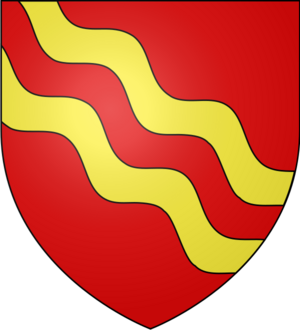William Brewer (justice) facts for kids
William Brewer (also known as Briwere or Brigwer) was an important person in England who lived a long time ago. He was a judge and helped run the country for kings Richard I, King John, and Henry III. He owned a lot of land and started several religious places. He was from a place called Tor Brewer in Devon and passed away in 1226.
William Brewer's Life Story
We don't know much about William Brewer's family history. He might have been the grandson of another William Brewer, who was a Royal Forester in Hampshire. A Royal Forester was someone who looked after the king's forests. William Brewer, who became a Bishop of Exeter, was one of his nephews.
William Brewer started his career as a Forester, just like his grandfather. By 1179, he became the Sheriff of Devon. A sheriff was like a chief law enforcement officer for a county.
When King Richard I was away on a big journey called the Third Crusade, William Brewer was one of the special judges called justiciars. These judges helped run the country while the king was gone. In 1193, he even helped with talks in Germany to get King Richard released after he was captured. Around the same time, he started working as a Baron of the Exchequer, which meant he helped manage the king's money. He did this job for many years.
Under King John, William Brewer was very active in the government. He was one of the people who witnessed many of the king's official documents. He was also appointed sheriff in many different counties, like Berkshire, Cornwall, Devon, and more! Because he was so busy and powerful, some people in these counties didn't like him very much.
William Brewer also used his wealth to help others. He started and supported three monasteries:
- Torre Abbey in Devon, which he founded in 1196.
- Mottisfont Abbey in Hampshire, founded in 1201.
- Dunkeswell Abbey in Devon, also founded in 1201.
In 1224, William Brewer decided to leave his busy life behind. He became a monk at Dunkeswell Abbey. He died there in 1226 and was buried with his wife in front of the main altar.
William Brewer's Family
William Brewer married a woman named Beatrice de Vaux. She passed away before him, around 1220. Together, they had several children:
- Richard, who died young, before his father.
- William, who was the oldest son still alive when his father died. He married Joan de Redvers but did not have any children. When he died in 1232, his five sisters shared his inheritance.
- Graecia, who married Reginald de Braose.
- Isabel, who married Baldwin Wake.
- Joan, who married William de Percy, 6th Baron Percy.
- Alice, who married twice. Her first husband was Reginald de Mohun, and her second was William Paynel.
- Margaret (or Margery), who married three times: first to William de la Ferté, then to Eudo de Dammartin, and finally to Geoffrey de Saye.
William Brewer's Lands
William Brewer was very good at getting land. He started with not much but ended up owning a huge amount of property across several counties. By 1219, he was taxed on over sixty "knight's fees," which were large areas of land that could support a knight.
In Devon, William Brewer owned many important places. Some of his lands included:
- Buckland Brewer
- Tor Brewer, which later became known as Tor Mohun. This land was inherited by his daughter Alice and her family.
- Holsworthy, which went to his daughter Margaret and her family.
- Ugborough, also inherited by his daughter Alice and her family.
- Bradworthy, part of which he gave to Torre Abbey. The rest went to his daughter Alice.
- Wolborough, which he gave entirely to Torre Abbey.
 | Janet Taylor Pickett |
 | Synthia Saint James |
 | Howardena Pindell |
 | Faith Ringgold |


